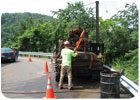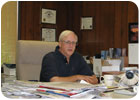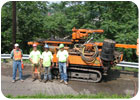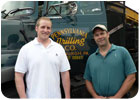
Drilling shallow soil borings for a highway with an Acker XLS.
Just outside Pittsburgh, in McKees Rocks, Pa., third-generation drilling contractor, Tom Sturges, presides over Pennsylvania Drilling Co., a 55-employee firm that, besides drilling contracting, also manufactures a wide range of drilling products.
Sturges provides a little historical background: “The J.A. Brennan Drilling Co. started up in Wilkes-Barre, Pa., in 1900. My grandfather bought the company back in the teens and moved it to the Pittsburgh area some years later.
“The manufacturing side of the company got started in the 1950s,” Sturges relates. “We manufacture everything from drill rods and casing to water swivels, shelby tubes and hoisting plugs - virtually everything you need to do core drilling, with the exception of diamond bits and drill rigs. We sell to some of the local people, plus we ship to drilling companies throughout the United States and Canada.”
As far as the revenue split between the manufacturing and contracting businesses, Sturges tells us, “It's about even; it does vary up and down from year to year, but typically, it's fairly even.” Of those 55 employees, 30 work on the contracting end, and 25 are involved with the manufacturing, with a few from each group devoted to administrative and management duties.

Tom Sturges got his start in the industry in 1970.
Work Performed
“Most of the business we do on the drilling side is for roads, bridges and highways - geological investigations,” he says. “We do some for buildings, but not as much. We do a lot of drilling for environmental purposes - siting new mines or environmental cleanup. Our basic market area reaches about 400 miles to 500 miles; we'll go into Pennsylvania, West Virginia, Virginia, Ohio, New York and Kentucky.”Asked about Pennsylvania Drilling's rig situation, Sturges explains, “We have 16 to 18 rigs; we're running just 10 right now. We have rigs manufactured by Acker, Central Mine Equipment, Mobile Drilling, Diedrich and SIMCO.” When told that was quite the mélange, Sturges agrees, saying, “Yes, we do take an ecumenical approach here; we're looking for the perfect drill rig.”
“And,” he adds, “we're still looking for the perfect employee.”
On that note, we turn to Sturges' son, Caleb, who's in charge of almost all hiring matters: “It's a struggle to find employees, people who want to work this hard. A lot of the drillers we have are phenomenal; they can do just about anything. The younger guys we have had as assistants to the drillers, those are the people who cycle through almost non-stop. There are a couple of them who have stayed on for a long time, but for the most part, it's a position for a younger person. You have to have a strong back to do it. Some people try it and say to themselves, 'This is something I could do,' but, more often than not, they decide that it's not something they could do. The better people we find usually come through personal recommendations of people who are acquaintances of drillers we already have on staff.” Caleb reasons that the person providing the recommendation knows what kind of person they'd be bringing in, and the person coming in would have a decent idea of what to expect. And it probably doesn't hurt that there's some mutual pressure there, as well.

Pictured (l-r) are Craig and Norm Hormel (a father-and-son team), Tom Sturges and Ron Doyle.
Project Trends
I asked Caleb about recent project-type trends the firm is experiencing. “Starting in the mid- to late-1990s,” he explains, “there was a lot more environmental cleanup going on, with remediation projects at gas stations and chemical plants and the like, where there was a need to monitor and assess what was happening at the site. That work really has tapered off as of late. Most of the work we're seeing right now is new highway construction and mineral exploration.”Tom provides a broader historic overview: “Early on, we were 100 percent mineral exploration, and then we were about 90 percent geotechnical work for the bridge and highway work. Then, we went to about a 90 percent environmental company, including a lot of work at some nuclear facilities in Ohio, and back again today to about a 90 percent geotechnical firm. So, things have shifted quite a bit over the years.”
Chiming in on more recent trends, he says, “We've seen an increase in the past couple years in coal-related mine-site work. I know there are a lot of people who do mineral exploration, which is something we typically don't do; we're more into the geotechnical and environmental aspects of mine work. But the mineral exploration is something that I look to continue and also to increase. On the manufacturing side, a lot of what we do is casing or pin piles and micropiles. That has grown to be a large part of our business, and I look for that to increase. It's a very good foundation support technique, and it seems to be increasing in practice.”

Caleb Sturges and Frank Jones.
The Fourth Generation
As for Caleb's experience, he tells us, “I've been working for the company on and off ever since I was a kid. After a while, I was working around the shop, doing maintenance and repair-type stuff, and then I moved on to working on the drill rigs as a helper. That was something that helped me out a lot because I ended up getting so much hands-on experience, spending time with the drillers and seeing how things really are done. You can stand around all day watching a guy drill without being able to really grasp all the things that need to be done to make sure the project keeps moving and is successful. Experiencing it for myself gave me a much greater appreciation for what our drillers go through to get things done, and that enables me to better manage our projects.”That experience comes in handy on those perhaps too-often occasions when another helper decides that the drilling game isn't for him. “If the need arises, I can jump in there and keep the job moving and keep the customer happy,” Caleb says. “Managing in this industry means that you're hands-on all the time. You might have to be a helper for a day or you might be loading or unloading
or hauling equipment - it's always something. If you're bored doing this job, you're not doing it right.”
Concurring, Tom offers, “This is a business that is extremely interesting, in that you just don't know what you're going to be confronted with on any given day. There's never a dull moment; things always are changing - sometimes a little too quickly.
“Business is good and it keeps on growing,” he says. “We have some expansion plans that we're trying to figure out. We're keeping our options open. Any time you do any kind of expansion, it involves capital investment. You have to look at interest rates and other demands that are involved. Everything has to line up.”
Queried about the company's succession plans, Tom quips, “Eventually, when I get to be 95 years old or so, I'll probably retire; hopefully Caleb will be interested.” Caleb's response: “That's sounds fine by me.”
Report Abusive Comment